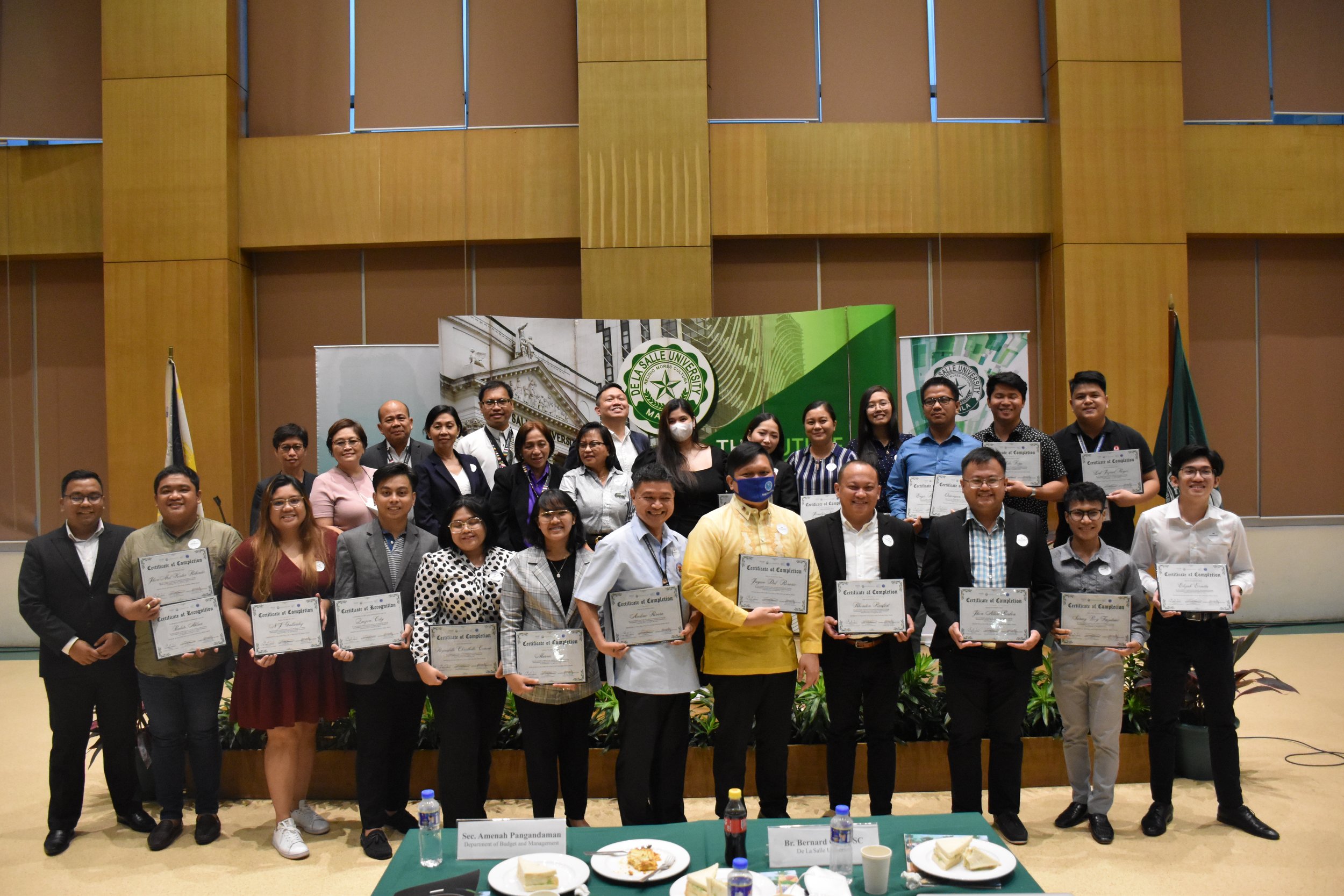Manila, Philippines – Local youth leaders from seven (7) local government units graduated as Open Government Youth Champions through POGCHAMPS: Project Open Government (Youth) Champions' three-month training program.
LYDO and LYDC from 7 LGUs ( Province of Albay, Province of Northern Samar, City of Manila, Quezon City, Municipality of Balete, Aklan, Municipality of San Mateo, Rizal, and Municipality of Odiongan, Romblon) with DBM Secretary Amenah Pangandaman, DLSU President Br. Bernard Oca FSC, and Galing Pook Foundation Board of Trustees Member Ms. Ma. Gladys Sta. Rita
The training program concluded with a culminating activity last May 10, 2023, at De La Salle University, Malate, Manila. The event showcased Local Government Unit’s (LGUs) Open Government Youth Action Plans and their learning journey throughout the training program.
Department of Budget and Management (DBM) Secretary Amenah Pangandaman stressed that the public’s trust and confidence in the government could be earned through strengthened citizen participation. She also urged the youth leaders to be a beacon of transparency and public participation.
"Remember that as we become more transparent, accountable, and participatory, we gain and regain the trust of our citizens. That is why we need to be open and encourage citizen participation so that together we can take action and catalyze change for the better," Secretary Pangandaman said.
DBM Secretary Pangandaman extends her congratulations to the participants in her welcome message.
On the same occasion, National Youth Commission (NYC) Commissioner Reena Vivienne Pineda congratulated the participants for completing the program. She also extended NYC’s support to the youth leader for their future youth development programs and projects.
"Now I am confident that you will continue to make a positive impact on your communities and that you will be able to use what you have learned to create a better future for all Filipinos," Commissioner Pineda added.
NYC Commissioner Reena Vivienne Pineda lauds the participants in her closing message.
Photo from: National Youth Commission Facebook Page
Building Bridges of Support for Mental Health Advocacy
Representatives from the LGUs of the Province of Albay, Province of Northern Samar, City of Manila, Quezon City, Municipality of Balete, Aklan, Municipality of San Mateo, Rizal, and Municipality of Odiongan, Romblon, presented their Open Government Youth Action Plans and shared their stories throughout the training program.
In their video, the Municipality of Balete, Aklan, laid out their action plan for addressing cases of teenage pregnancy and mental health problems in their locality by establishing the Balete Adolescent and Youth Facility, which aims to provide consultation and counseling services for the youth.
Echoing the same cause, the LYDO of San Mateo, Rizal, also hoped to address mental health issues in their province by implementing a long-term program such as peer mental health respondent.
The LGU also mentioned conducting focused group discussions, collaborating with different stakeholders, and publicizing the initiative’s progress as steps for transparency and engagement.
Meanwhile, the LGU of Quezon City (QC) showed its means of addressing gadget addiction among the youth in their locality by applying the values they learned from the program.
"Ini-encourage po namin sila na gamitin ang pribilehiyo ng isang kabataang QC sa pamamagitan ng pagtangkilik ng mga serbisyo, produkto, at mga lugar na makikita sa QC."( We encourage them to utilize the privilege of being a youth in Quezon City through its good services, products, and places found in the city.) LYDO Reynafelle Cenera said.
Pushing Towards Youth Economic Empowerment
Albay Local Youth Development Officer (LYDO) Rhondon Ricafort emphasized their priority to expand school youth's economic empowerment through youth employment projects.
"We wanted to focus on our youth's employment, especially sa out of school youth. That is why ito yung inuna naming ipakita, and we make it sure na… the office has the funds to support especially dun sa basic na gagamitin ng aming out-of-school youth." (We wanted to focus on our youth's employment, especially for out-of-school youth. That is why we presented it first, and we made sure that the office has the funds to support it, especially for the basic needs of our out-of-school youth.) he said.
The Municipality of Odiongan, Romblon presented their action plan to primarily deal with the increase in school dropout cases in their locality. Among the initiatives are implementing educational assistance programs and community learning hubs for youth.
Odiongan, Romblon LYDO officer, Engr. Reden Escarilla, also mentioned collaborating with various agencies to conduct livelihood programs. "Sa pakikiisa ng pamahalaang bayan ng Odiongan, pangarap namin na maiangat ang antas ng kabataan at walang iwanan.” (Through the support of Municipal Government of Odiongan, it is our dream to uplift the level of youth and leave no one behind.) he said.
Applying Principles and Practices of Good Governance
Jhon Mel Rebenito, Balete, Aklan LYDO shared that identifying the root cause of the problem, consulting with community stakeholders, planning financial management, and advocating for transparency are the key takeaways to strengthening community participation and accountability.
"Through this program na-enlighten kami. Although we have a different set leadership training na pinagdaanan, additional na leadership style and naibigay ng De La Salle University (La Salle Institute of Governance)," Rebenito added. (Through this program, we were enlightened. Although we underwent a different set of leadership training, the De La Salle University (La Salle Institute of Governance) provided additional leadership styles.)
Meanwhile, the training program brought the Manila City Local Youth Development Council (LYDC) team closer to the various communities they reached out to, emphasizing the importance of openness to changes and differences for the betterment of the programs and projects.
Jaycee Del Rosario, member of the Manila City LYDC, shared budgeting process is crucial in obtaining accountability. He added that "discussions with my local development youth officer opened my consciousness to how tedious the budgeting process is on the LGU level. Civic education, driven mechanisms, and funding accountability are some of the options the youth can do in attaining accountability through public service."
Northern Samar LYDO Representative Jhon Allen Berbon, compared their training experience to the journey of the disciples to Emmaus. "We have been journeying with these OGP values even before La Salle Institute of Governance has mentored us... However, just like the disciples, we have been completely opening our eyes that...there is so much more work to do."
It is also highlighted in their presentation that accountability, public oversight, and consistent practice of democracy are the key elements of open government.
San Mateo, Rizal LYDC Representative Elijah Ermita pointed out that public trust is public office. "Wala ang opisina ng gobyerno at wala mismo ang gobyerno kung wala ang tiwala ng taumbayan satin.” (The government office and the government itself would not exist without the trust of the people in us.)
He also underscored accountability, transparency, and citizen participation as important elements of gaining public trust.
Organized by the La Salle Institute of Governance, in collaboration with the National Democratic Institute, the Galing Pook Foundation, and the National Youth Commission, the POGCHAMPS: Project Open Government (Youth) Champions training program served as a platform to empower young leaders and equip them with the necessary skills to foster open government practices and youth development in their respective localities.
The culminating activity was supported by the Philippine Open Government Partnership as part of the celebration of Open Government Week 2023.
Participants with LSIG Director Dr. Ador Torneo, and Galing Pook Foundation Board of Trustees Member Ms. Ma. Gladys Sta. Rita






